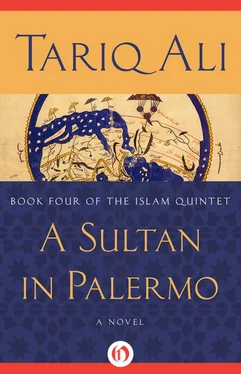It was the same Sultan Rujari for whom Muhammad al-Idrisi had written this book. His own title had been simple: ‘Nuz’hat al-mushtaq’ or ‘The Universal Geography’, but Rujari’s old tutor Younis had advised him that since the book would never have been completed without Rujari’s material assistance, a more appropriate title might be ‘al-kitab al-Rujari’ or ‘The Book of Roger’. In the face of such a suggestion from the heart of the palace, what could he do but bow and accept. Idrisi repressed his anger, but the Court eunuchs ensured that every shop-keeper in the Palermo bazaar had news of the title alteration. The bazaar believed, wrongly, that Idrisi had offered the delights of his body to the Sultan. The new title appeared to confirm the slander. And each spiced the story before passing it on to the other and thus the vanity of a ruler became an epic with many layers in which a follower of the Prophet had been deeply humiliated and not for the first time.
The subject of all this attention began to ask himself whether the trouble he was having with an opening line had now been transcended by the new title. A recurring dream had disturbed his sleep for over a year. It was Sultan Rujari, always in the same multi-coloured satin robe, lying half-naked under a lemon tree weighted down with ripe fruits. Rujari would stand, discard the robe and attempt to seduce a tethered doe, but just at the point when the union between the human and animal worlds was about to be consummated, Muhammad would wake up in a state of complete unrest. He would get out of bed, pace up and down on the cold marble floor muttering, ‘You shouldn’t be in my dreams so often’, and then drink some water slowly to calm his fractured nerves. It was always difficult to resume his sleep. Why did the dream only come when he was in Palermo? Never when he was on the sea or when he went to visit his family in Noto or in the house of his close friend, the physician, Ibrahim bin Hiyya of Djirdjent. Once he had tried to discuss the matter but Ibrahim had laughed, disclaiming any interest in the phenomena of dreams.
More than once, he thought of paying a visit to Ibn Hammud, the richest silk merchant in the qasr, who, in his spare time, interpreted dreams and calmed the fears of worried men. He was much in demand and once Muhammad got as far as the front of the shop, but he did not enter. His caution had become an insurmountable barrier. It was too dangerous. Ibn Hammud would not be able to keep the dream secret. Indeed, an exaggerated version would find its way back to the palace. The eunuchs would giggle as they regaled each other with it and each recounting would become more outrageous. Then these guardians of the harem would tell the concubines and one of them would goad a willing eunuch to whisper it in the Sultan’s ear. The Sultan would be enraged and that could be the end of everything. Everything. Not just the book, but also its author. And if Rujari became really angry he would ensure that the eunuchs, too, came to grief. The risk was not worth the suffering.
The last ten years of Idrisi’s life had been consumed by the book, but as the vessel approached Palermo, he knew the completion could not be delayed much longer. The Sultan would be angry. He wanted to read the book before he died and his illness had made him anxious. And Allah alone knew what would happen to a poor mapmaker after the death of his patron. Once again he heard the mocking farewell of his best friend the day Ibn Hamid had left the island for ever, boarding a boat destined for Malaka in al-Andalus.
‘Come with me, Muhammad,’ the poet had said. ‘Here you will be nothing more than a melancholy beggar in a foreign capital.’
Why should he feign any longer? Why should he not write what he wanted? With a sense of determination, Muhammad al-Idrisi retired to his cabin, sat down at the table and wrote a single sentence on the first page of his universal geography:
The earth is round like a sphere, and the waters adhere to it and are maintained on it through natural equilibrium which suffers no variation.
It was done. This would be the opening of his personal edition of the work. As for the rest, he would praise Allah, the Prophet, the Sultan and anyone else who had to be flattered. A compromise, but it satisfied him.
He climbed to the deck again and took a deep breath of sea air. Palermo must be very close. He could sense that from the laden breeze, carrying the rich perfumes of herbs and flowers and lemons. He knew these well and had carefully catalogued the plants and trees that produced them. None of his friends accepted that they were different from those of other islands and the cavalier fashion in which these men flaunted their ignorance angered him greatly. He had made extensive notes on the herbs and flowers of the Mediterranean islands and after his years of work and travel he could identify an island in the dark just from its smells. He smiled as he recalled the summer night he had been lying on the deck — the only sounds the tender lapping of the sea against the hard brown wood of the ship — gazing at the stars. Suddenly a breeze arose and a soft aroma assailed his senses. It was a special variety of thyme and he knew immediately they were approaching Sardinia.
The fragrance of Palermo was like a whiplash. Bittersweet memories of his childhood and youth could still overpower him. His thoughts were interrupted by a boy — he could not have been more than seventeen or eighteen years of age, the colour of bronze, with long golden hair — who came to him with a glass of lemon sherbet and smiled, revealing snow white teeth. How did he keep them so clean? He was glad Simeon was happy again, but that was not enough to assuage his guilt. Hearing his screams one night, he had remained silent, failed to intervene, even though he knew full well his presence would have ended the boy’s torture. The commander of the ship was engaged in a time-honoured rite. Indifferent to Simeon’s pain and fragility, he had violated him mercilessly. Droit ancien de marinier. And then, without warning, tears poured down his face as he realised that he had been thinking of Walid. What if some brutish captain had abused him just like this boy? The absence of his son made him mindful of the agony of the young flautist.
For a week after the assault, the boy had neither eaten nor played the flute, nor dared look any sailor in the face, even though some had endured the same violent torture themselves, experienced the same insufferable grief and would have been sympathetic to his plight. Others had laughed and teased him and, in time, the boy recovered. The first sign of his return to the rhythms of everyday life came when the anguished sounds of a flute were heard at sundown, bidding farewell to the dying day. Few eyes remained dry. The man who made maps, consumed with guilt, pledged inwardly to find a better place for this boy. Muhammad drank the sherbet , handed back the glass and stroked the young head.
‘Have you ever travelled to Baghdad, master? Have you seen the House of Wisdom which has large rooms to observe the sky and many more books than in our Sultan’s library?’ the boy asked. ‘What does the city look like? Is it true what they say, that our city is larger than Baghdad? Could this be so? And Qurtuba? You know that city well, don’t you, master? Will you return there one day?’
The mapmaker nodded, but before he could elaborate, the minarets of Palermo had been sighted. Suddenly, the deck was crowded with men shouting ‘Allahu Akbar’ and ‘Siqilliya sana-hallahu’ [Sicily, may Allah preserve her!] and preparing for their arrival. A group of tired young men, their burnt bodies and worn-out faces reflecting the exhaustion of a day’s work, brought down the rust-coloured sails and were folding them on the deck. In the twilight the crew began to sing a soft, mournful chant, as they rowed the ship into port. The captain, in search of praise for the discipline of his men, came up to the scholar and bowed, but Idrisi ignored him, still wanting to punish him for abusing the boy. But chiefly the author of the universal geography was preoccupied with the sky, still clear blue, and with the moon, already out and competing for attention with the setting sun. It must be the seventh month of the year, he thought. He had been away for nearly four months. Too long. And then the city was before them.
Читать дальше












